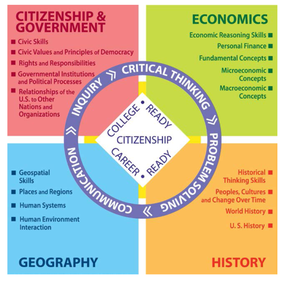 Credit: Minneapolis Public Schools
Credit: Minneapolis Public Schools The Common Core State Standards already drive much of this much-needed and long-overdue change, forcing a depth-over-breadth approach to instruction in reading, writing, and math. But to be meaningful and fully-effective, this approach must extend beyond those skill standards and into content areas like social studies and science.
This kind of approach is already taking hold with science as The Next Generation Science Standards, which have been developed by a consortium of states, do exactly this by emphasizing “cross-cutting” skills that are useful across all science disciplines. This integrative approach, if implemented for all content standards, could allow us to restructure in-seat hours by breaking down the traditional inter-discipline classes (i.e. instead of separate classes for geography, history, economics, or government, students would have one social studies class that integrates all disciplines in thematic units) and ensure that students make critical connections. It can help move us toward fewer, clearer, and deeper standards across the board.
Beyond re-writing the standards themselves to allow teachers the flexibility to dive deeper into content topics, we must also re-examine our source materials. U.S. textbooks are far longer than those of nations with higher international rankings and they attempt to cover far too much material in too short a time. States, districts, schools and individual teachers should develop curricula complete with diverse source material that expose students to a variety of perspectives through challenging primary and secondary sources. That means districts need to simultaneously increase the push for and review of rigorous curricula and pull back on the design details, allowing schools and teachers to plan relevant, thematic units for their students based on the source material that allows them to dig the deepest. Instead of focusing accountability on content covered, focus accountability on critical-thinking skills achieved as measured by meaningful, authentic assessments.
This method of teaching and evaluation may require a serious commitment of time by staff, but it’s an effort well worth the result: students who can not only compete with international peers on standardized tests but can create, critique, construct, and connect their way to real-world success.
Scott Goldstein is a social studies and ESL teacher at a D.C. public charter school. He can be reached via email or Twitter.

 RSS Feed
RSS Feed